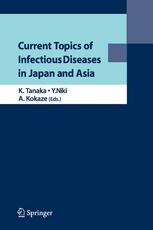

Most ebook files are in PDF format, so you can easily read them using various software such as Foxit Reader or directly on the Google Chrome browser.
Some ebook files are released by publishers in other formats such as .awz, .mobi, .epub, .fb2, etc. You may need to install specific software to read these formats on mobile/PC, such as Calibre.
Please read the tutorial at this link: https://ebookbell.com/faq
We offer FREE conversion to the popular formats you request; however, this may take some time. Therefore, right after payment, please email us, and we will try to provide the service as quickly as possible.
For some exceptional file formats or broken links (if any), please refrain from opening any disputes. Instead, email us first, and we will try to assist within a maximum of 6 hours.
EbookBell Team

4.0
26 reviewsIt is a great pleasure to present Current Topics of Infectious Diseases in Japan and Asia. This is a memorable scienti? c publication for Showa University, prepared in conjunction with the 6th Annual Meeting, Showa International Symposium for Life Sciences, held at the university in 2009. This symposium was supported in part by Grants for the Pro- tion of the Advancement of Education and Research in Graduate School. On behalf of Showa University, it is a privilege to see the publication of this volume of scienti? c research articles for the advancement of knowledge about infectious diseases in Japan and Asia. Akiyoshi Hosoyamada, M.D., Ph.D. President Showa University, Tokyo, Japan February 2010 Preface The 6th Annual Meeting, Showa International Symposium for Life Sciences, hosted by Showa University, was held in the university’s Kamijo Hall on September 19, 2009. The symposium was entitled “Current Topics of Infectious Diseases in Japan and Asia” and focused on various infectious diseases in the region. Two prominent researchers from overseas — Dr. Lee Ching Ng from Singapore and Dr. Guanghui Li from China — and eight Japanese speakers gave lectures, which were followed by productive discussions, with special comments by Dr. Patricio N. Abinales of Kyoto University.